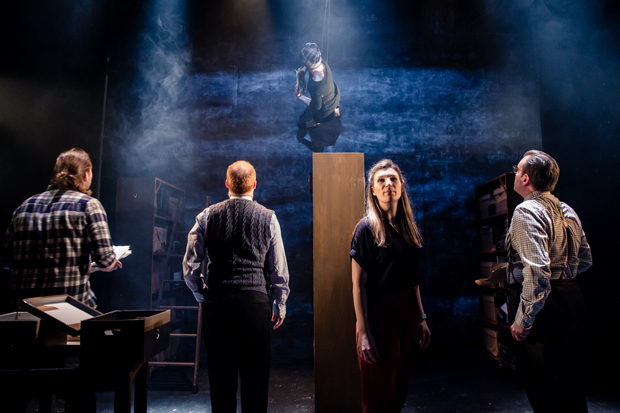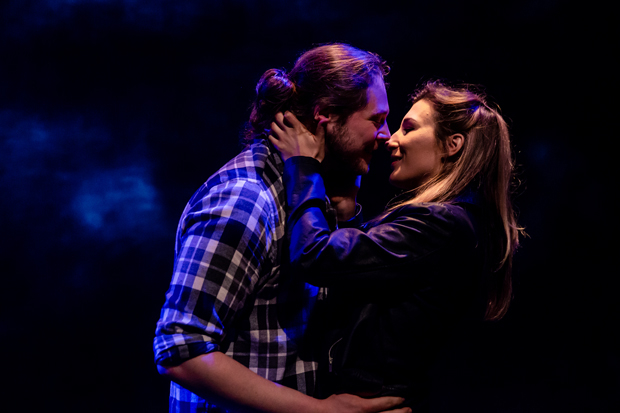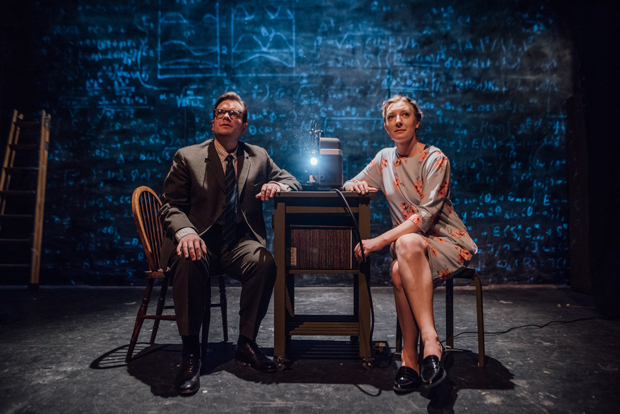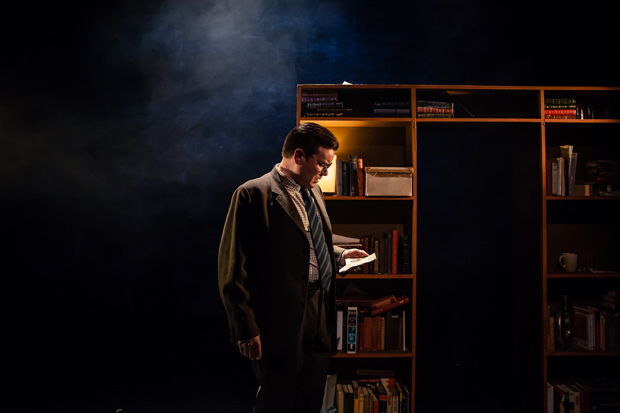Secret Life of Humans Digs Deep Into the Nature of Humanity

(© Richard Davenport)
There is a plot of sorts in Secret Life of Humans — it is, in part, a mystery tale in which the grandson of a famous British scientist discovers a dark side to the great man he thought he knew. But the narrative is so obviously a clothesline for the grander scientific and philosophical questions that David Byrne — the British playwright and New Diorama Theatre artistic and executive director, not the singer and Talking Heads front man — wants to ruminate on that, after a while, one wonders whether this ambitious show might have been better off without such concessions to conventional storytelling.
The show, making its US premiere as part of 59E59 Theaters' Brits Off Broadway 2018 series, is said to have been inspired by Yuval Noah Harari's 2015 book Sapiens: A Brief History of Humankind, but that turns out to be only a half-truth. In execution, Byrne's play is more a clash between the critical view of humanity that Harari espouses in his book and the more optimistic perspective offered by Jacob Bronowski (who died in 1974), the aforementioned British scientist, especially in his famous 13-part BBC series The Ascent of Man.
Harari's viewpoint is articulated through Ava (an appropriately aloof Stella Taylor), who, within the play's opening minutes, directly challenges Bronowski (Richard Delaney, more warmly paternal in manner) on his opinion that "humans have moved forward in a straight, unbroken line of progress." Ava, who finds Bronowski's view of human history "simplistic," finds confirmation of her more pessimistic outlook on humanity through what she and Bronowski's grandson, Jamie (Andrew Strafford-Baker, exuding a charmingly awkward boyishness), gradually uncover about some of his grandfather's behavior during World War II.

(© Richard Davenport)
Ava meets Jamie on a Tinder date, and it is during this encounter that she discovers that he's related to Bronowski. The relationship that develops between them during their tumultuous night together is the closest Secret Life of Humans comes to a dramatic arc, and it's a pity this attempt at infusing the sleuthing and philosophizing with an emotional through-line isn't more compelling. Strangely, the deeper both of these characters wade into Bronowski's hidden past, the less we find ourselves invested in them: Ava becomes increasingly more self-serving, and Jamie exhibits a naïveté over what he discovers about his grandfather that seems a bit hard to swallow, especially in this atomic age of ours.
Considerably more engaging — the real raison d'être of Byrne's play, in fact — is the intellectual dynamic between Ava and Bronowski. It's an academic tug of war that bridges space and time under Byrne and Kate Stanley's direction. Here, characters in the present day — Ava and Jamie — intermingle and sometimes interact in the same spaces with those from the past —Bronowski; his wife, Rita (Olivia Hirst, full of patience and understanding); and George (Andy McLeod, projecting an angst always bubbling under his unassuming exterior), a colleague of the doctor's who recruits him for top-secret scientific work during World War II.

(© David Monteith Hodge)
The surreal atmosphere of Secret Life of Humans is enhanced by Catherine Webb's lighting design, which bathes the production in shades of foreboding dimness, and Yaiza Varona's moody original music and sound design, which adds a droning, otherworldly hum to some of the more overtly cerebral moments. Zakk Hein's projections — which include the use of clips from The Ascent of Man, footage of Bronowski's final interview with Michael Parkinson, and a snippet of a lecture delivered by British philosopher Bertrand Russell — help flesh out the play's intellectual context. Jen McGinley's sets add to the show's scholarly aura with shelves of books lining the sides of the stage. Secret Life of Humans even features moments in which actors, supported by wires, walk on the stage's back wall and look up, putting us in the position of looking down at these figures in a godlike manner.
Such a wealth of visual and aural imagination suggests where the dramatic priorities of David Byrne and company truly lie. Secret Life of Humans is at its most stimulating when it ignores the thinly characterized relationship and fairly unsurprising mystery at its center and becomes a free-ranging meditation on what defines us as human beings, what "progress" truly means, and what the future of humanity may look like, for better or for worse. It may not be a substitute for the oracular insights that can be gleaned from reading Harari's book or viewing The Ascent of Man, but Secret Life of Humans offers enough to leave us pondering anew some of the largest eternally burning questions of our time.

(© Richard Davenport)










